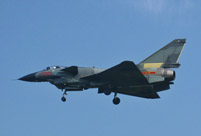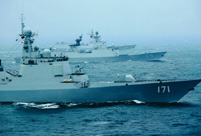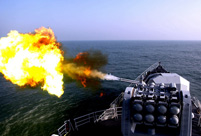

Sri Lanka's Prime Minister Ranil Wickremesinghe kickstarted an official visit to China from Wednesday. One of the big questions of his tour is whether the two sides will nail the divergences down over the Beijing-funded $1.4 billion port city project in the Sri Lankan capital of Colombo.
Ever since the country's new government was formed in January last year, Sino-Sri Lankan relationship has experienced some fluctuations, which have been reflected in the suspension of the port project. After a year-long pause, the project got the green light shortly before Wickremesinghe's visit. But the major part of the construction has not been resumed yet. In the meantime, protests were staged on Monday in Colombo, with hundreds of people demanding government to halt the project, according to media reports.
Some in Sri Lanka are looking for ways to escape the tangle around the project. A comprehensive resumption of the project may be right around the corner, and it is believed that Wickremesinghe will finalize the agreement over the port city with Beijing this time.
Apart from partisan politics in Sri Lanka, pressure from India has also been playing a crucial role in suspending the project. New Delhi is often biased when viewing Chinese investment in South Asia. New Delhi's anxiety stems from its suspicion that China is making an attempt to contain India. Despite the fact that neither Beijing's investment to Sri Lanka, nor the latter's economic development will do any harm to India, New Delhi is still obsessed with the idea that China might create a military encirclement around India.
For example, in late 2014, Sri Lanka allowed a Chinese submarine and a warship to dock at its port in Colombo, and India strongly opposed it. After Sri Lanka's new cabinet assumed the office, it claimed that similar incident would not happen again.
However, it is a common international practice for warships to dock at other countries' port for goodwill visit, refueling and maintenance. Besides, China's anti-piracy operations in the Gulf of Aden need support from Indian Ocean nations. Therefore, there may also be discussions over the matter between the two sides this week.
The argument within the country over being pro-India or pro-China might gradually calm down along with Wickremesinghe's China tour. New Delhi does have huge influence on Colombo, yet the relationship between Sri Lanka and China has not infringed on India's interests. Colombo is now well aware that neither pro-India nor pro-China is the appropriate policy, and the best option is to keep a good relationship with all major powers.
Currently, the China-funded constructions in Pakistan cannot serve as a strong foothold for China, given the calamitous state of Pakistan's security. Sri Lanka can be of great importance for China in the security strategic layout in Indian Ocean. It will not only provide security assurances for nearby navigation channels, but will also promote the 21st Maritime Silk Road.
Given Sri Lanka's underdeveloped infrastructure construction, it is looking forward to what the Beijing-initiated Maritime Silk Road can bring it. Further carrying out specific programs in the initiative will be very helpful for the country's economic development, employment and the improvement of infrastructural facilities.
The major task for Sri Lanka's current government is economic development. Yet after its attempt to reduce its reliance on Beijing, Colombo has realized that there is no alternative. Over the past year, neither India nor the US has provided it with the attractive mega-projects that China did. It is therefore natural for Sri Lanka to turn around and embrace China again. Apart from the already existing cooperation, including the construction of Hambantota Port, Sri Lanka is now expecting to use its own geographical position to ink more new joint programs with China.
The article was compiled by Global Times reporter Li Aixin based on an interview with Zhao Gancheng, director of South Asia Studies at the Shanghai Institute for International Studies.
 The evolution of J-10 fighter
The evolution of J-10 fighter Top 10 Asian beauties in 2016
Top 10 Asian beauties in 2016 Train rides through blossoms
Train rides through blossoms HD pictures of battleships of PLA Navy
HD pictures of battleships of PLA Navy East Sea Fleet conducts combat drills
East Sea Fleet conducts combat drills Sophie Marceau goes square dancing in Guangzhou
Sophie Marceau goes square dancing in Guangzhou Police officers learn Wing Chun in E. China
Police officers learn Wing Chun in E. China Charming models compete in super model contest in Beijing
Charming models compete in super model contest in Beijing Beauties wearing Tang dynasty costume pick tea leaves
Beauties wearing Tang dynasty costume pick tea leaves Top 20 hottest women in the world in 2014
Top 20 hottest women in the world in 2014 Top 10 hardest languages to learn
Top 10 hardest languages to learn 10 Chinese female stars with most beautiful faces
10 Chinese female stars with most beautiful faces China’s Top 10 Unique Bridges, Highways and Roads
China’s Top 10 Unique Bridges, Highways and Roads My tiger mother controlled me with Chinese food
My tiger mother controlled me with Chinese food Shanghai court finds against maternity tourism company
Shanghai court finds against maternity tourism company Pranks under fire after video of celeb wedding shows actress harassment
Pranks under fire after video of celeb wedding shows actress harassment For foreigners, Chinese talent and reality shows offer a chance to hit it big
For foreigners, Chinese talent and reality shows offer a chance to hit it bigDay|Week